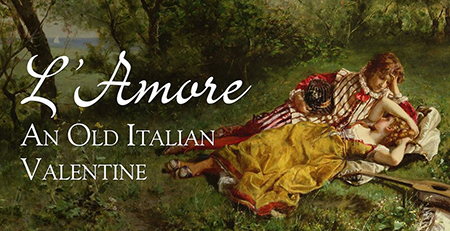by Timothy Robson

Despite references to love and flirtations (including joking implications of possible amorous liaisons among the Apollo’s Fire performers), most of the concert consisted of instrumental works by Antonio Vivaldi, Nicola Porpora (an opera aria arranged by Sorrell), and Giovanni Battista Fontana. Vocal works by Barbara Strozzi and Claudio Monteverdi sung by soprano Erica Schuller and tenor Brian Giebler filled out the program.
As much as anything, the concert was a celebration of the genius of Vivaldi and the virtuosity of Apollo’s Fire violin soloists Olivier Brault, Carrie Krause, Julie Andrijeski, Evan Few, Alan Choo, Emi Tanabe, and Adriane Post. Within the strictures of the Baroque concerto, ciaccona, and trio sonata forms there are endless possibilities for heroic and improvisatory virtuosity. In the Concerto in D for 4 Violins, RV 549, Vivaldi employs the soloists in quickly changing combinations.
Porpora was primarily known as an opera performer and singing teacher of the famous castrato Farinelli. Sorrell made a felicitous transcription of his duet “Alto Giove” from Polifemo, whose melodies intertwined with aching dissonances beautifully resolved.
Barbara Strozzi’s Che si può fare? sets words of a scorned lover: “What can one do if rebel stars have no pity … to soothe my sorrows?” Soprano Erica Schuller brought full-throated emotion to these dramatic words. Her voice was sometimes gentle and lyrical, but at dramatic climaxes seemed forced, almost strident, her intonation imperfect.
In Monteverdi’s opera The Coronation of Poppea, the emperor Nero plots to dispatch the reigning queen Ottavia and to replace her with his mistress Poppea. Erica Schuller’s approach was dramatically effective in the Strozzi aria, but less so in the opera’s final duet Pur ti miro (“I adore you”), which is music of the utmost sensuality.
Schuller and her Nero, tenor Brian Giebler, were vocally mismatched: Giebler’s high, pure, light voice was overwhelmed by Schuller’s more dramatic presence. Perhaps it was symbolically correct to have Poppea dominate, but it did not work well musically — the intertwined phrases were too disparate in sound.
Three short “musical jokes” from Monteverdi’s Scherzi Musicali were much more successful in their light, folk-song qualities, and were presented almost like a summer garden party. The Apollo’s Fire instrumental ensemble entered into the fun, including Jeannette Sorrell on tambourine.
The second half of the concert was mostly given over to instrumental works by Vivaldi. The Ciaccona in C, RV 114 featured violinists Olivier Brault and Carrie Krause, along with the fabulous Apollo’s Fire continuo players, cellist René Schiffer, theorbo and guitar players William Simms and Brian Kay, and Sorrell on the harpsichord.
In Vivaldi’s Concerto in C for 2 violins, RV 507, Brault was paired with Adriane Post, but he was the dominant partner, playing very aggressively. In the third movement Brault improvised an extended cadenza. Eventually it dawned on the audience that Brault was elaborating in Baroque style on Happy Birthday in tribute to Sorrell, whose birthday it was.
Erica Schuller returned for two more vocal works. Her performance of the short love note Vedrò con mio diletto from Vivaldi’s opera Giustino was distinguished for its soaring phrases, and the varied timbres of the plucked instruments were effectively exploited during the da capo. Monteverdi’s Ohimè, ch’io cado (“Alas I tumble down”), a lament, provided Schuller with opportunities for virtuoso singing and lavish ornamentation.
The concert closed with a rollicking performance of Vivaldi’s familiar “Summer” concerto from The Four Seasons. Alan Choo was the outstanding and sensitive soloist. Before the performance, Sorrell gave a brief music appreciation tour through Vivaldi’s tone painting.
Published on ClevelandClassical.com February 25, 2020.
Click here for a printable copy of this article



